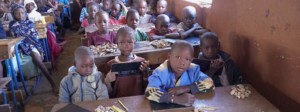Improving Education in Mali Mine Communities
October 13th, 2022 | News
The Improving Education in Loulo Mine Communities project improved student retention and performance in school, especially that of girls, by strengthening the education system in Mali and increasing community support for learning.
From 2013 to 2022, the project:
To improve learning outcomes, we worked to enhance classroom instruction and mobilize parents and community members around learning. By presenting school results analysis at community events, like Academic Merit/Excellence Days, students became more engaged in their learning success.
We supported communities in organizing meetings to solicit input from school management committees, parent-teacher associations, mothers’ associations, and local education administrators. We built the capacity of these groups to manage their various roles and responsibilities in decentralized education.
We addressed gaps in inclusivity through teacher training on gender equity and inclusion, community awareness-raising on the importance of girls’ education and inclusive education, and capacity building of mothers’ associations. These interventions targeted the needs of all children and focused on increasing school attendance.
Our partners at all levels, including local NGOs, grassroots community structures, and the Ministry of Education, received capacity building support to ensure the project’s sustainability. Mothers’ associations have been especially successful in improving education, taking ownership of project activities, and managing savings funds.
To ensure best practices in reading and mathematics instruction, we trained 30 pedagogical advisors to support teachers. Training focused on methods and techniques for remedial learning and the use of math teaching tools. We also trained pedagogical advisors and school principals on teacher observation tools and established communities of practice for teachers to share best practices and lessons learned.

Through this project, we learned that strong community mobilization around education increases access to quality education, whether it’s by providing financial support from mothers’ associations, organizing remedial learning programs, or encouraging enthusiasm for learning through community events.
World Education fosters enduring partnerships across regions and sectors to advance education outcomes for all. We offer education systems strengthening, program design and implementation, applied research and evaluation, capacity development, and policy development services.